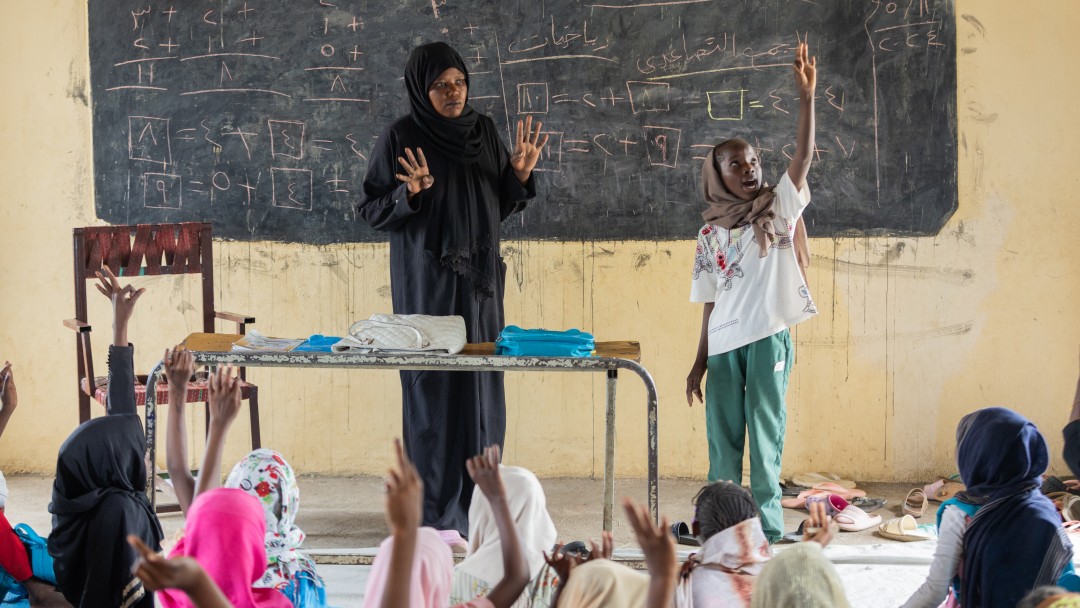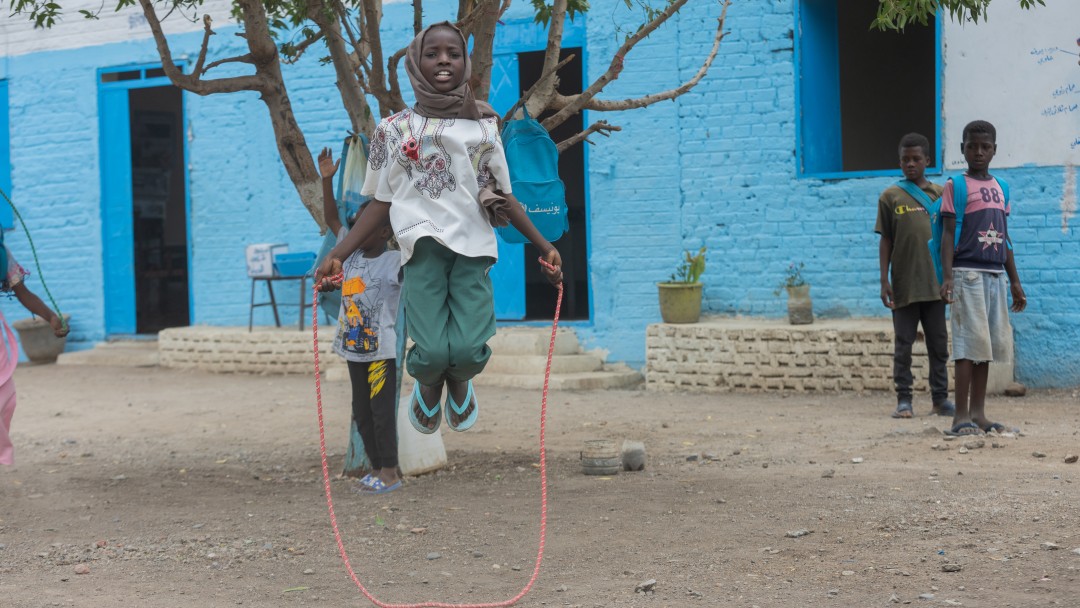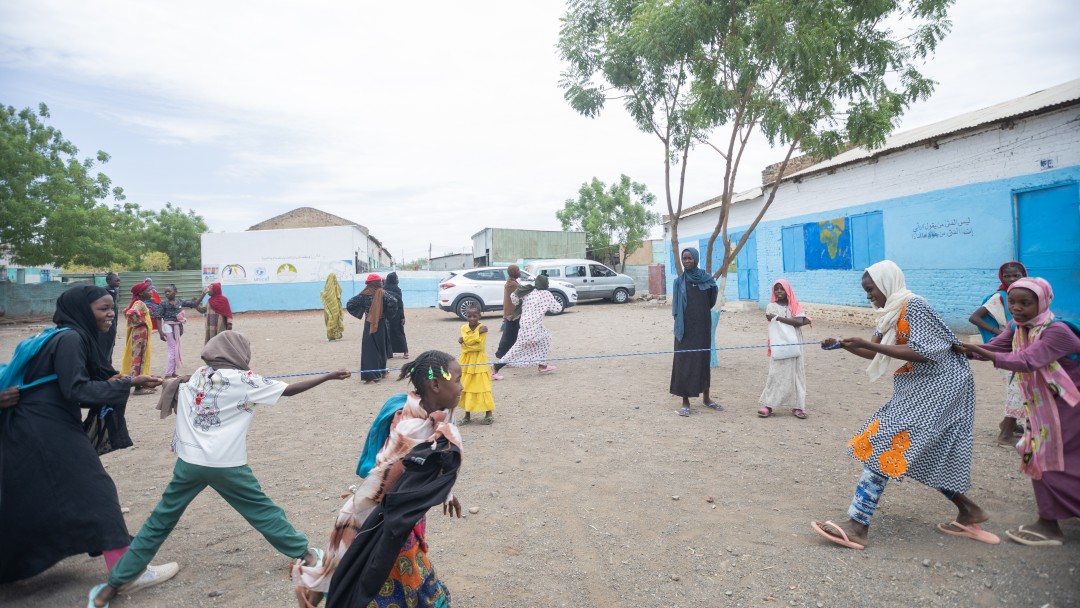
The regular army and the paramilitary Rapid Support Forces (RSF) have been fighting for supremacy in Sudan since 2023. More than half of the population is starving and millions of people have been displaced. Aid organisations are warning of a famine catastrophe. Many families have been forced to eat leaves and insects.
The supply situation for children and young people is particularly dramatic. The structural deficits that already existed in the areas of education and child protection have also worsened since April 2023: even before the outbreak of the current conflict, more than seven million children were not attending school and 70% of all ten-year-olds were unable to read simple sentences. The ongoing school closures in many parts of the country have meant that, according to UNICEF, 19 million children and young people currently have no access to the formal education system. In view of the structural deficits, millions of children will not have acceptable access to education for the foreseeable future.
On behalf of the German Federal Ministry for Economic Cooperation and Development (BMZ) and in cooperation with UNICEF, KfW Development Bank is involved in the ‘Integrated Education and Child Protection Project in Eastern Sudan’. The project region of River Nile and Northern State is home to 876,000 internally displaced persons, most of whom live in host communities. Up to 220,000 children, young people and their families are to be supported in 85 so-called Makannas. The Makanna concept - Arabic for our space - stands for a safe place to learn and play, and many children also receive psychological help. At these child-friendly and safe places - either in school buildings or in tents in camps - UNICEF also provides clean water and a mobile health clinic for children and their families. Severely malnourished children are treated with therapeutic supplementary food.
Proscovia Nakibuuka Mbonye (UNICEF) tells the story of eleven-year-old Rabha, who fled Khartoum and is attending school for the first time in her life in Makanna October North.
For the first time in her life, 11-year-old Rabha can read, write and do maths. The girl, displaced from Khartoum, sits at the front of the class, listens attentively and takes every opportunity to answer the teacher's questions. At home, Rabha and her siblings attended the religious school, also known as Khalwat, where she mainly learnt the Koran by heart. When she saw her classmates going to school in uniform and with rucksacks, she always wondered why she never had the opportunity to join them. But her mother's answer was always the same: ‘I don't have any money.’
When Rabha from Khartoum came to the UNICEF-supported safe Makanna October North in Gedaref, she had many questions. Here she did many things for the very first time, lovingly accompanied by her favourite teacher Fatima. Here Rabha heard people speak English for the first time; learnt to read, write and count. ‘In her first English lesson, she asked me what this strange language was. She had never heard of it before,’ says Fatima. It was also here that Rabha first received a UNICEF rucksack in which she can keep her books - an item that is very dear to her.
The Makanna, where Rabha feels safe and secure, accommodates over 300 children from host communities and refugee camps every day thanks to the support of German development cooperation through KfW Development Bank. Supported by trained supervisors, the children take part in various activities, including games, theatre, clubs, art and drawing as well as learning methods. Rabha sits with her peers in a small class and listens attentively to the teacher. It has been a long and adventurous learning journey for the girl. In a maths lesson, they learn to count and add. Rabah voluntarily steps forward and counts from one to ten. ‘I like to speak up in class - and when I have the right answers, everyone applauds me,’ says Rabha. Without safe learning spaces like this, Rabha would not have had the opportunity to attend school and learn. ‘When we arrived in Gedaref, they opened the schools for us,’ she says. She reaches for her exercise books, which are safely stowed away in her rucksack. ‘I didn't have a bag in Khartoum, I only had a wooden board and a wooden stick-like pen. But when I came here, I learnt to write in exercise books and on the blackboard.’ As well as learning, Rabha also enjoys sporting activities at the centre. Her favourite game is skipping rope.

When Rabha is not in class, she jumps outside, plays tug-of-war and makes music with friends. Her biggest worry is that she will no longer be allowed to study. Through her teacher Fatima, she has learnt that education can make a crucial difference for children, especially girls. ‘Education is very important to me. I want to learn,’ Rabha emphasises. Although she longs for her homeland, she is tormented by the thought of trading her home for education. She would rather stay in Gedaref to learn. She is proud of the progress she has made along the way. Thanks to the skills and self-confidence she has gained in the clubs, Rabha is unstoppable and already has her future career firmly in her sights: ‘I want to be a teacher, because when I didn't know anything in class, a teacher helped me.’

Share page
To share the content of this page with your network, click on one of the icons below.
Note on data protection: When you share content, your personal data is transferred to the selected network.
Data protection
Alternatively, you can also copy the short link: https://www.kfw-entwicklungsbank.de/s/enzB1wpb
Copy link Link copied